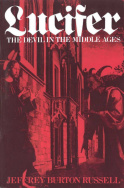 Jeffrey Burton Russell is one of the clearest thinkers I’ve ever read. I first encountered him in my background reading for Holy Horror, and have subsequently tracked down his books on the history of evil. In what is a dangerous move for a scholar, Russell admits in The Devil that he believes in some kind of personified evil. Except for religion scholars employed in seminaries, such thoughts are generally kept carefully guarded as academia has followed the materialist paradigm since it boldly declared that there’s no other way to know the world. Russell’s intellect penetrates through that posturing and logically lays out what can or can’t be known based on empirical evidence. And in Mephistopheles: The Devil in the Modern World, he concludes his historical sweep of an idea as old as civilization itself.
Jeffrey Burton Russell is one of the clearest thinkers I’ve ever read. I first encountered him in my background reading for Holy Horror, and have subsequently tracked down his books on the history of evil. In what is a dangerous move for a scholar, Russell admits in The Devil that he believes in some kind of personified evil. Except for religion scholars employed in seminaries, such thoughts are generally kept carefully guarded as academia has followed the materialist paradigm since it boldly declared that there’s no other way to know the world. Russell’s intellect penetrates through that posturing and logically lays out what can or can’t be known based on empirical evidence. And in Mephistopheles: The Devil in the Modern World, he concludes his historical sweep of an idea as old as civilization itself.
This is a wide-ranging book. The previous three covered long periods as well: antiquity through the Hebrew Bible, New Testament through late antiquity, and the Medieval Period. Mephistopheles has to cover from the Reformation through the present of the latter 20th century (when it was written). Finding evil in the modern world is arguably way too easy. Since 2016 it has become more fashionable to the point that an entire political party can laud it. Russell writes with the strong conviction that love and the will to goodness can overcome the tendencies of humans to allow hatred, fear, and prejudice to rule. What seems to be lacking, some three decades on, is the will. We have given in to our cynicism and elected the worst of our inclinations.
In William Friedkin’s documentary The Devil and Father Amorth, Russell, looking depressed, is interviewed about the reality of demons. His advice is to look for the good instead. Nevertheless, having spent years of his life researching how evil appears and reappears, his own fascination demonstrates why we return to the subject time and again. The world hasn’t righted itself. His books indicate that there is a way, but we continue to ignore that way, preferring instead to follow the loudest of mouths rather than the warmest of hearts. Some would personify this into Mephistopheles, the modern, entertaining aspect of the Devil. Others would claim it’s merely a metaphor. No matter which may be the case there’s no denying that evil exists. And if it exists it behooves us to know about it. And once we learn its identity we must name it.




